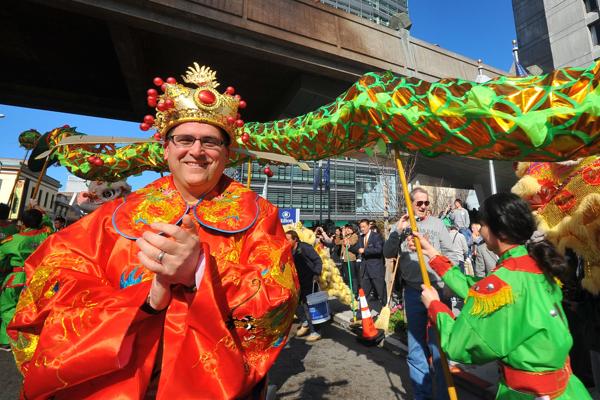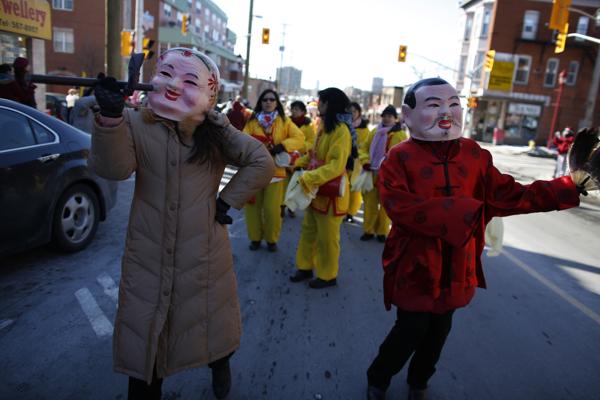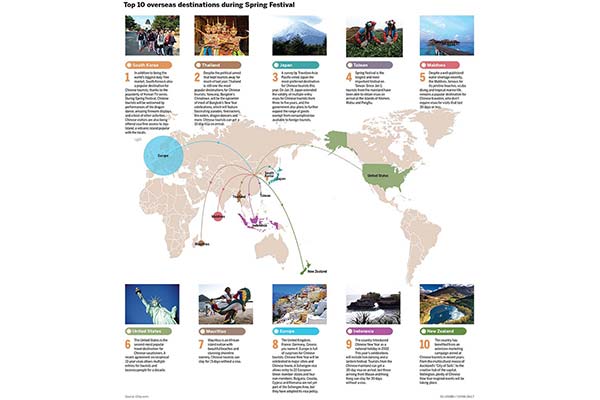
A man wears Chinese traditional clothing to celebrate the 2014 Spring Festival in Los Angeles.[Photo/Xinhua]
Rising incomes and national prosperity will see more Chinese than ever before heading overseas to celebrate Spring Festival, and tourist companies are anticipating a bumper holiday, as Su Zhou reports.
This year will be the first time that games analyst Liu Yang and his extended family have spent Spring Festival overseas.
“I suggested to my parents and parents-in-law that we could celebrate a different Spring Festival in another country and they said ‘yes’,” said Liu, a native of Baoji in Northwest China’s Shaanxi province who now lives in Beijing.
The family will travel to a “warm island to spend some quality time together”, without the packed sightseeing schedule and crazed shopping trips usually associated with the festivities, the 33-year-old said.
Although the older members of the family have never traveled outside China before, Liu isn’t concerned about the language barrier or visa applications.
“I travel frequently, and I’ve experienced the efforts other countries make to help Chinese visitors feel very welcome,” he said.
Spring Festival, also known as Lunar New Year, is the most important festival in China. It’s a time when people across the country travel to their hometowns and spend quality time with their immediate and extended families and close friends. Wives usually accompany their husband to his family home.
However, as standards of living and incomes rise in China, a growing number of families, such as Liu’s, are opting to celebrate the new year by traveling, especially to foreign destinations.
According to a report released by the online travel agency Ctrip in January, nearly 80 percent of Chinese would like to travel during the Spring Festival holiday, which lasts from Feb 18 to 24 this year.

As Spring Festival becomes increasingly popular overseas, more countries are organizing Chinese New Year-inspired events to attract local residents and Chinese visitors.[Photo/Xinhua]
Outward bound
More than half of those polled said they wanted to spend the vacation overseas, marking the first time that the number of people planning trips abroad has exceeded those aiming to travel domestically.
Dai Yu, Ctrip’s marketing director, said the Spring Festival will very likely witness the largest number of people that have ever headed overseas for the holiday, and bookings for popular destinations abroad could outstrip the same period last year by at least 50 percent.
According to Liao Weiyong, chief operating officer of Aoyou, an online booking agency operated by the China Youth Travel Service, sales of travel products for the holiday have been rising rapidly since mid-December, and bookings for outbound packages have significantly surpassed domestic ones.
“The sales of overseas travel products are expected to grow by at least 70 to 80 percent while those for domestic tourism will increase by 40 percent,” he said.
Destinations in Asia are the top draws for the Chinese market, with South Korea and Thailand at the top of the list, while Japan, the United States, New Zealand and Europe are also popular.
Neighboring countries and regions that have introduced favorable visa polices for Chinese tourists are also expected to see more visitors than before.
Within China, Taiwan remains a major attraction. On Jan 15, more tourists from the Chinese mainland applied for travel permits to the island than on any other day in the run-up to the New Year travel season so far.
According to the local media, the February holiday could be “especially crowded” this year, because almost 46,500 people have applied for entry permits-about five times the number of Chinese mainland visitors allowed into Taiwan every day-but many will probably only be able to visit the island once the holiday wanes on Feb 23.
“The sound economy, favorable visa policies, and the appreciation of the yuan are the major reasons behind the boom in outbound tourism during Spring Festival,” said Zhang Guangrui, honorary director of the Tourism Research Center at the Chinese Academy of Social Sciences.
“Changes in visa policies are really helping tourism. In the past, people had to prepare months in advance for a trip overseas. Now, with more countries and regions supporting visa-on-arrival or even visa-free measures for Chinese tourists, it’s becoming easier to travel as a family,” he said.
“Attitudes toward Chinese New Year have also changed. In the past, people insisted that a family reunion meant family members stayed together in their parents’ home and dined together. That’s why Spring Festival can look like a battlefield for some people who work far from their hometowns and want to book a ticket home. Now, things have changed. People have started to accept the idea that families can have a good time anywhere, just so long as they are together,” he said.
For Pan Lichao, 29, a researcher with a multinational company in Beijing, the problem is one of balance. “A lot of my friends are the only children of their families, and after getting married, many people, including me, face the same dilemma during the festival: which set of parents should we visit, and for how long? In my opinion, family travel is the best way of solving the problem.”

Top 10 overseas destinations during Spring Festival
Gearing up for the rush
To cater to Chinese visitors during the holiday, tourism bureaus, department stores, duty-free shops and scenic spots in foreign countries and regions are preparing to join in the celebrations.
China International Duty Free, a specialist marketer and distributor of Chinese consumer brands, is running a Hong Bao, or “Red Envelope” promotion in 12 airports and downtown duty-free stores across Asia and the Middle East until the end of the month. In China, cash gifts are traditionally presented in red envelopes.
Similarly, star-studded Beverly Hills is staging a month-long festival, marking the fourth annual Chinese New Year celebration in the US city.
As the new visa rules facilitate ease of travel, Julie Wagner, chief executive officer of the Beverly Hills Conference and Visitors Bureau, expects to see a rise in the number of Chinese tourists during Lunar New Year.
She said participating hotels in the city will provide special packages for Chinese guests throughout the month, offering popular amenities such as in-room kettles and Chinese teas, newspapers and breakfasts.
Some industry insiders have compared the holiday preparations to a “mini-Christmas” bonanza in Western countries.
According to a recent China Luxury Forecast survey, conducted jointly by the PR agency Ruder Finn and the market researcher Ipsos, travel spending in China will continue to soar. Last year, Chinese tourists spent $129 billion on overseas travel, and that figure is set to rise this year.
“Spring Festival is for family reunions and relaxing, but about 20 percent of our clients have booked shopping trips; we have arranged for shopping malls, outlets and department stores to meet their shopping needs,” Liao of Aoyou said.
James Roy, associate principal at the China Market Research Group in Shanghai, said riding the Chinese festival is a good strategy for retailers overseas. “The Chinese tourist is the biggest spender when traveling aboard, so it’s important to make Chinese consumers feel welcome and comfortable,” he said.
“However, there’s a line between showing respect, and failing to cater to consumers’ tastes. Many brands don’t know much about Chinese culture and fail to use Chinese elements to attract their target customers. They don’t know where the line is.”
Wu Jiangang, a research fellow at the China Europe International Business School, said Spring Festival doesn’t have the potential to become a “symbol of consumption” like the Western Christmas. However, the newly emerging Singles’ Day shopping promotion on Nov 11 may stand a chance.
“In Western countries, Chinese culture still has long way to go before it can be part of the mainstream. Chinese who want to shop overseas only care about discounts or product details, they don’t care whether these things are offered during Spring Festival, Wu said.
“However, I think festivals without a profound cultural background, such as Nov 11-so-called Singles’ Day-have a chance of being accepted by overseas retailers,” he said. “First, it (Singles’ Day) is about shopping, and second, it can easily be understood by people outside China. There’s no cultural barrier.”
“Now, with the overseas expansion of the e-commerce giant Alibaba, Singles’ Day has become a perfect platform for promotions in overseas markets. It could certainly become a new global festival with Chinese elements.”
